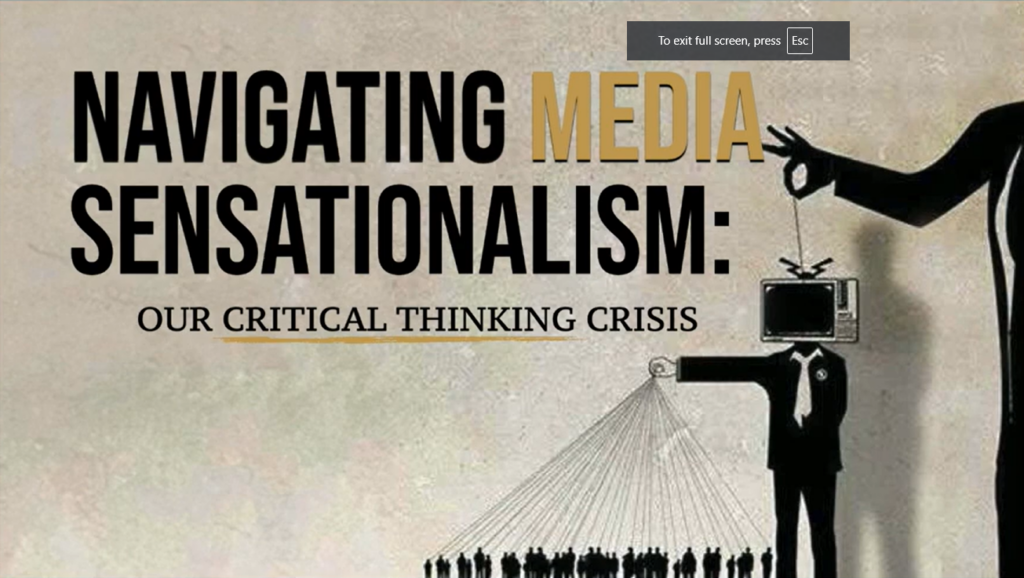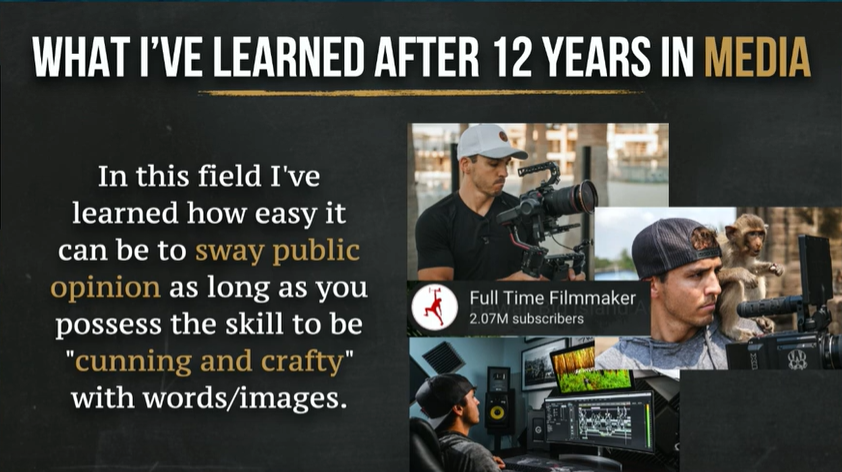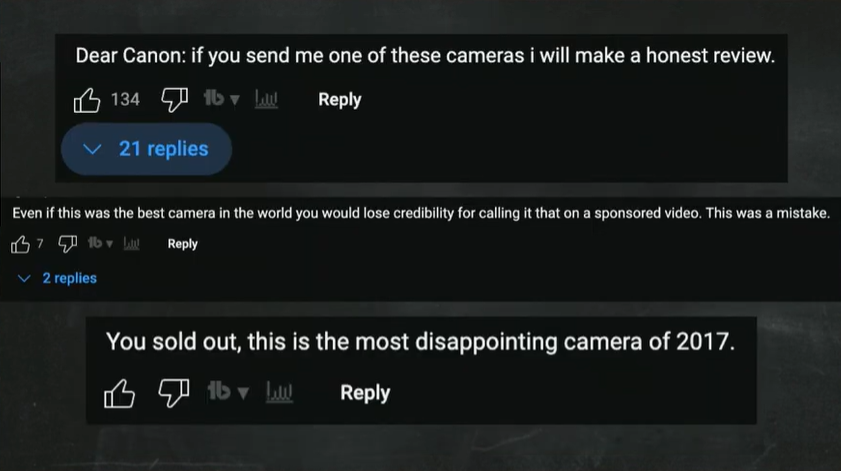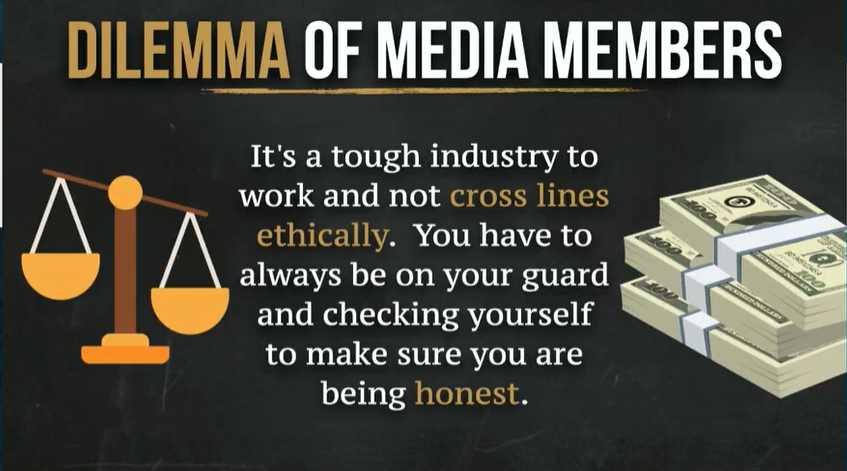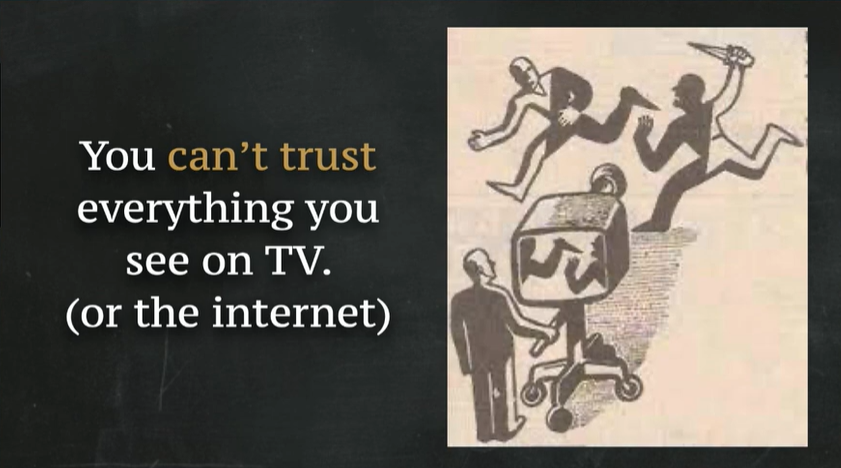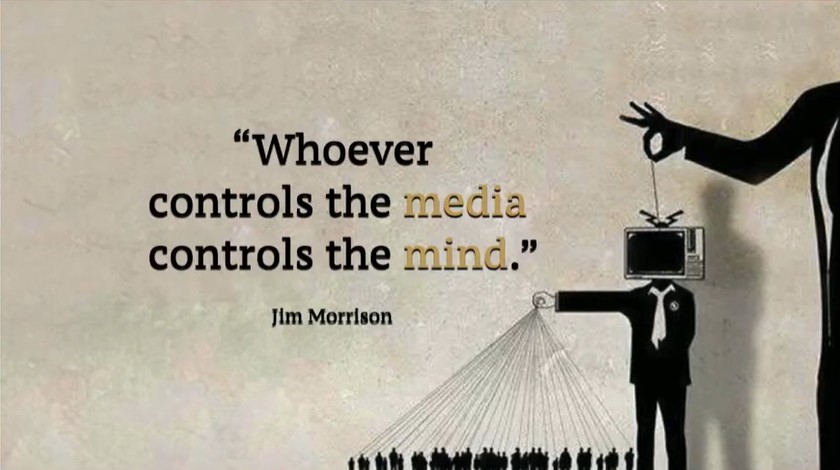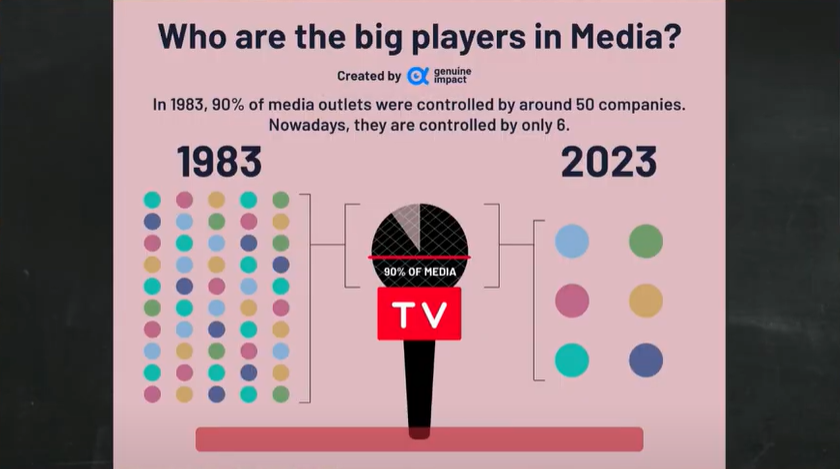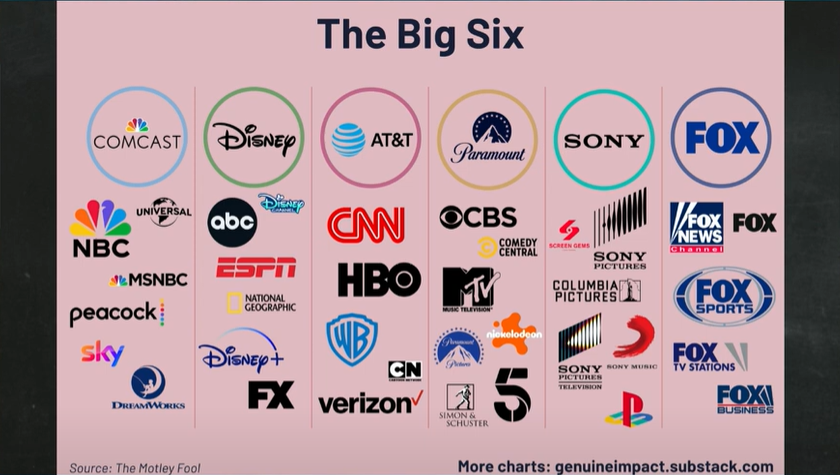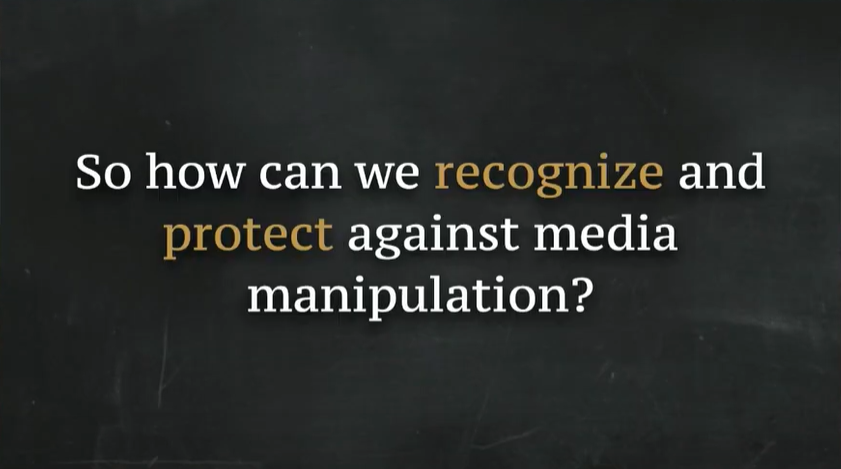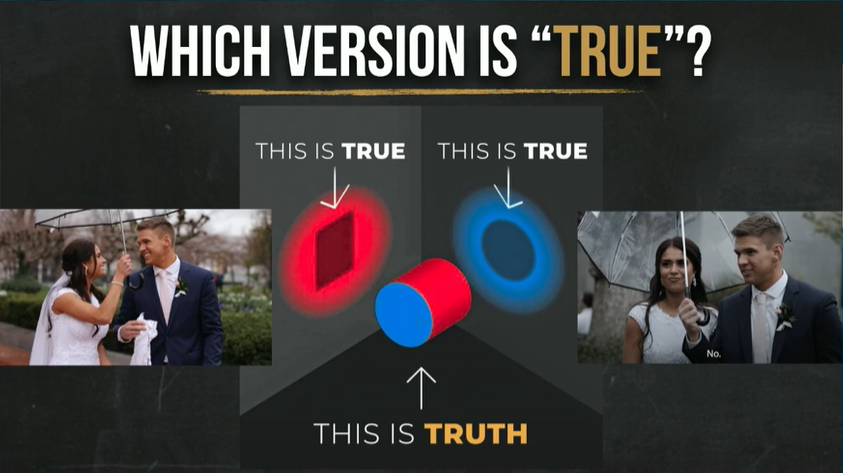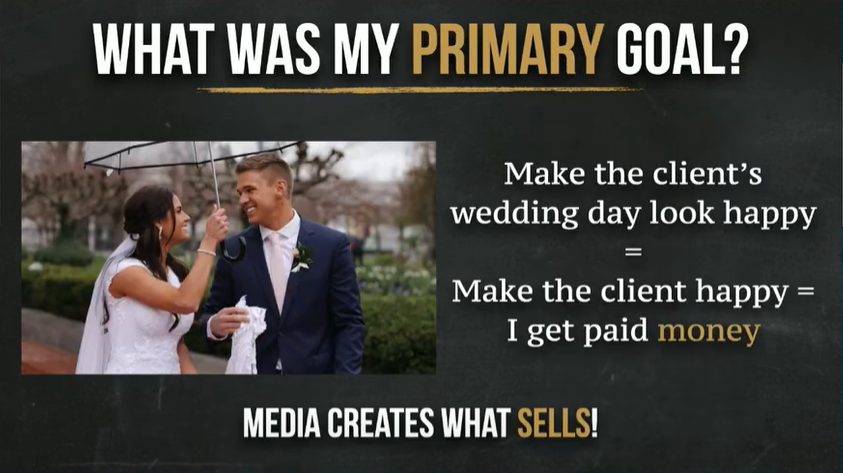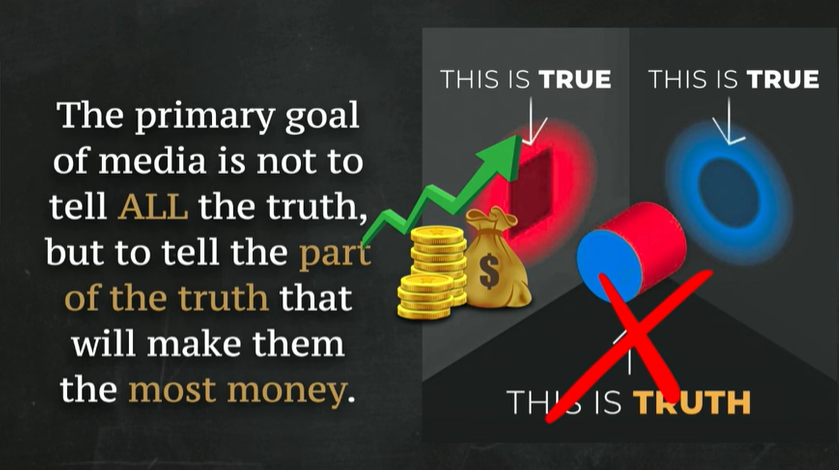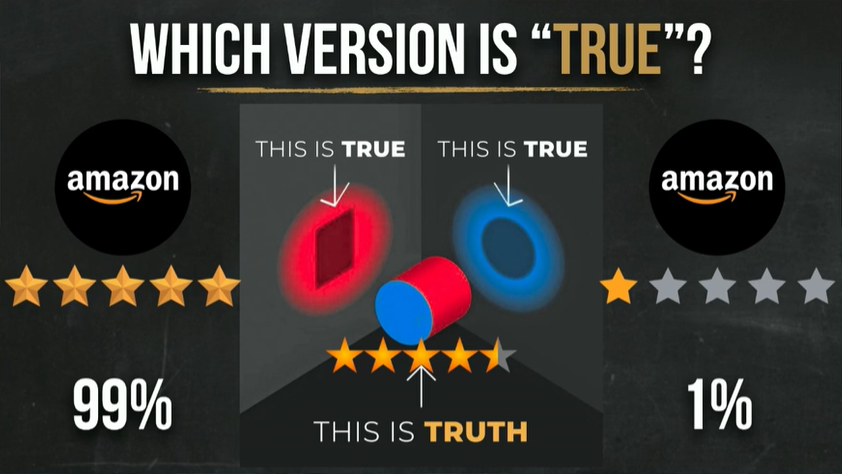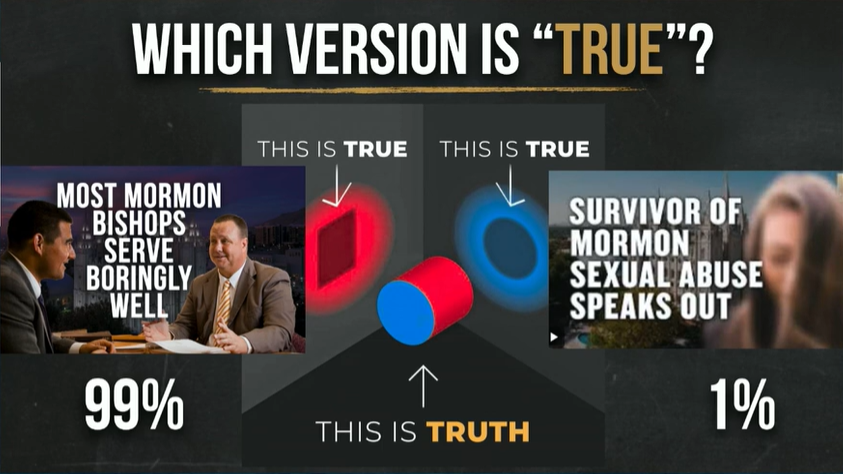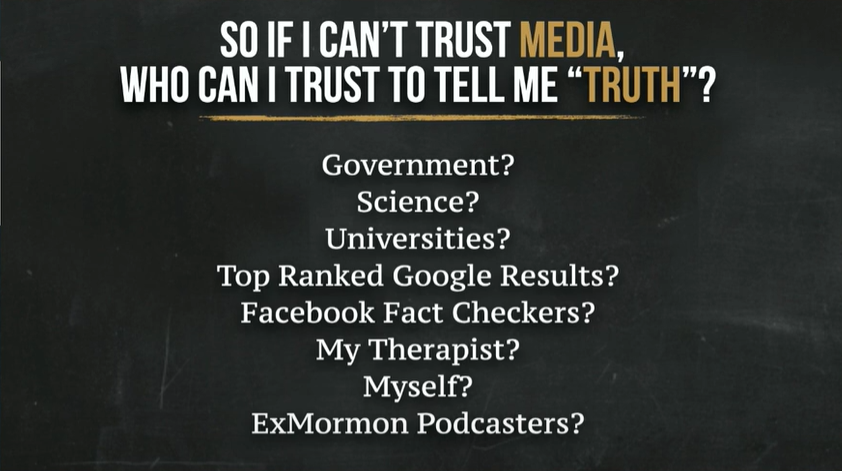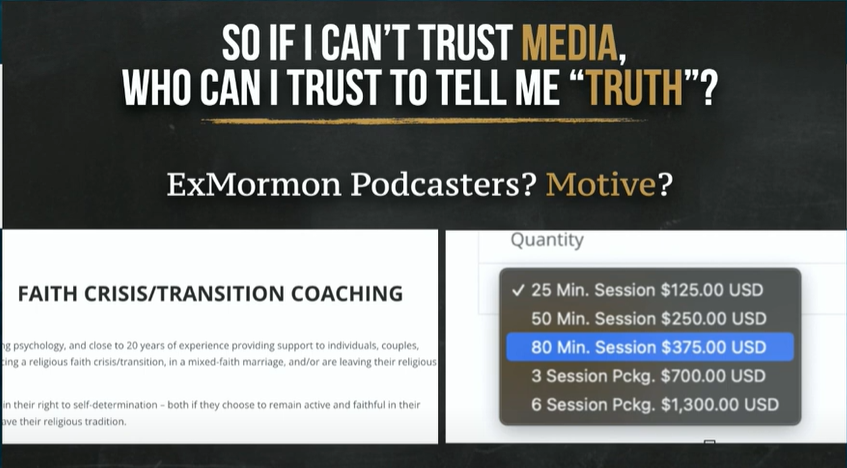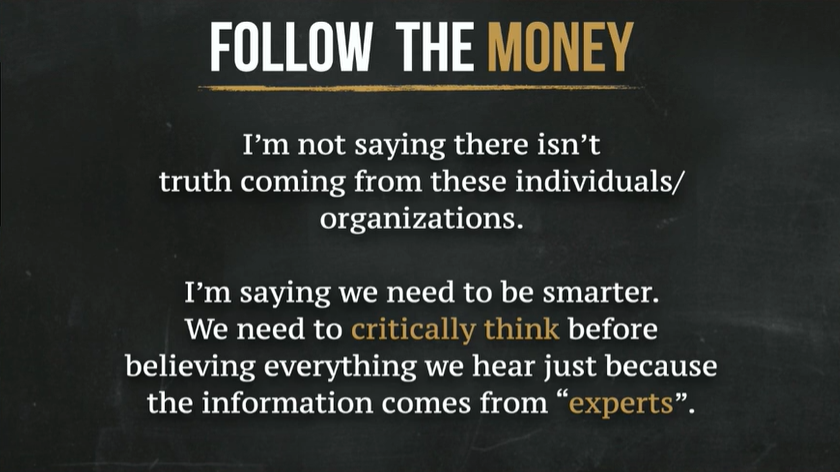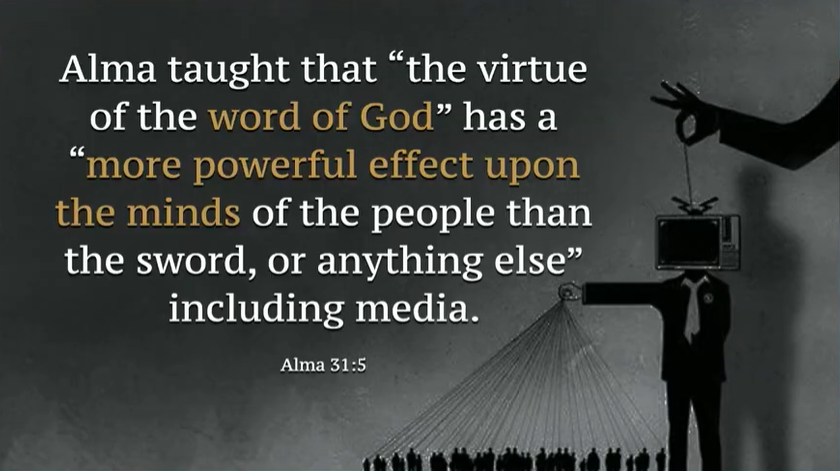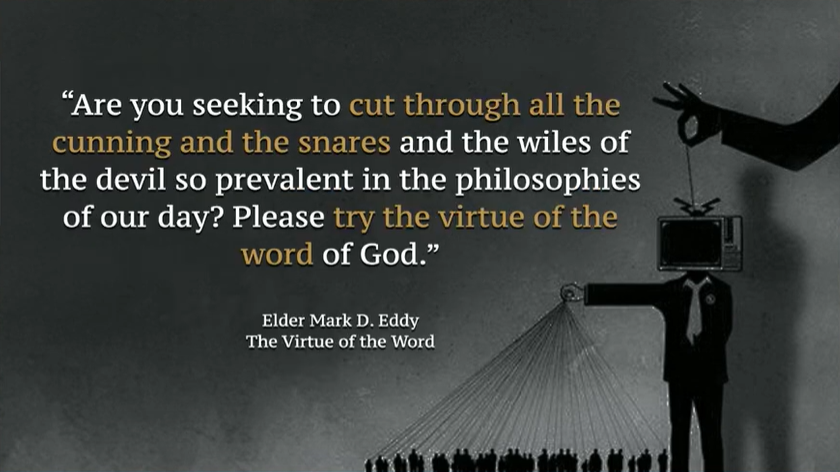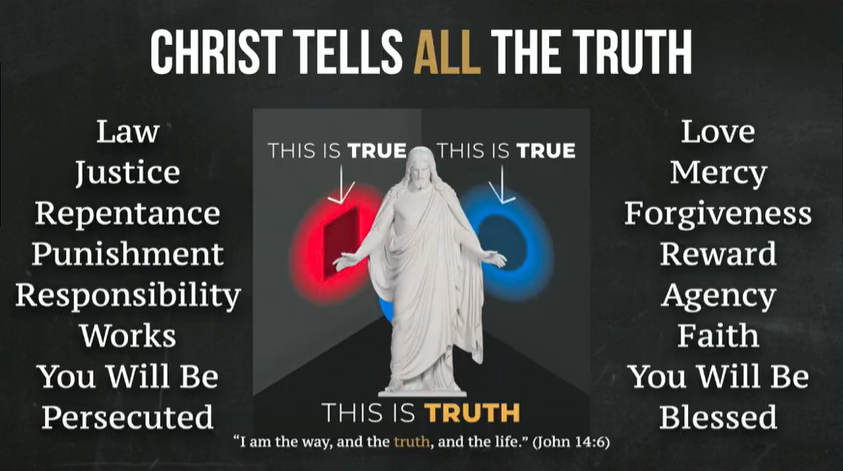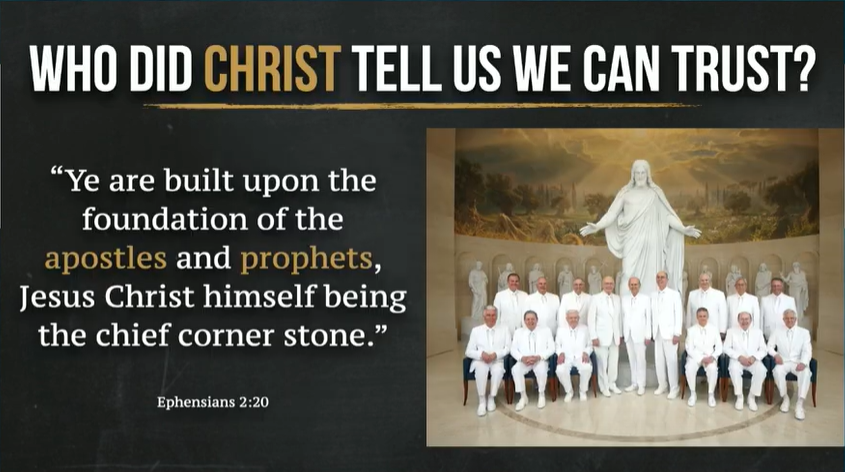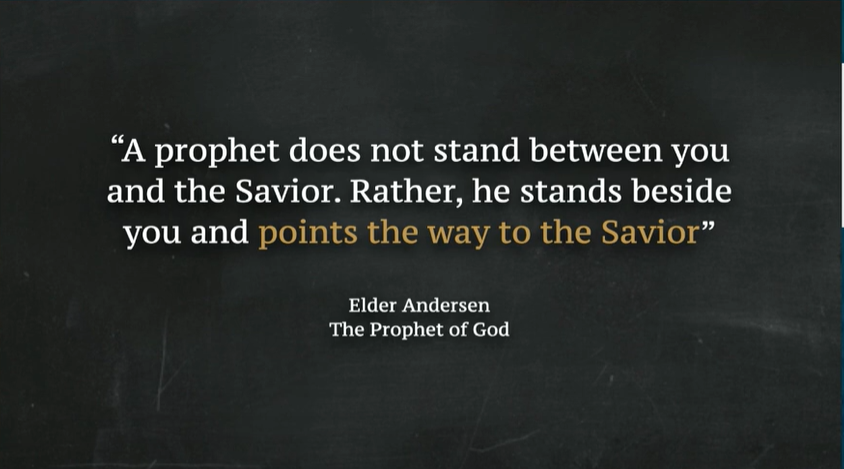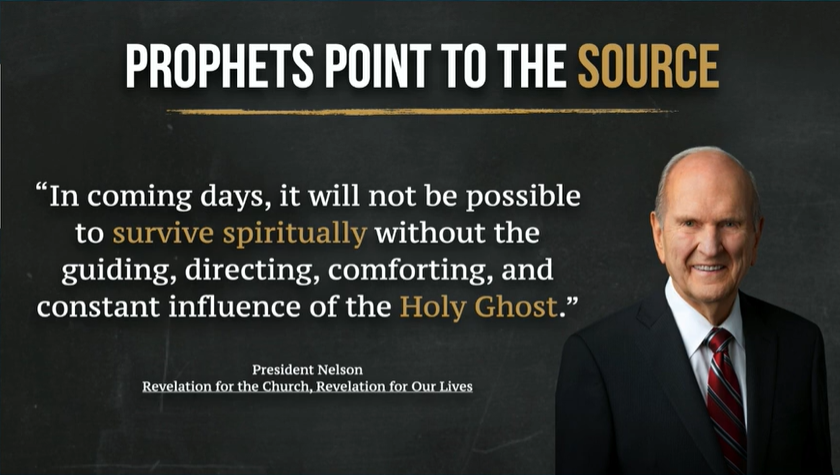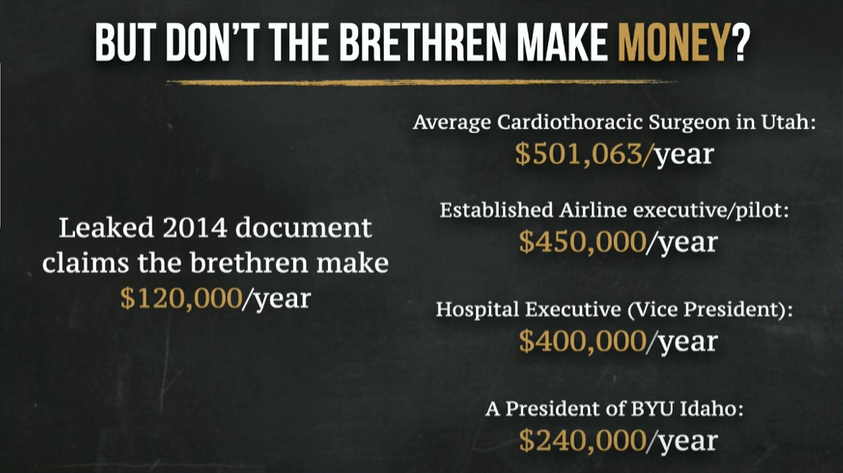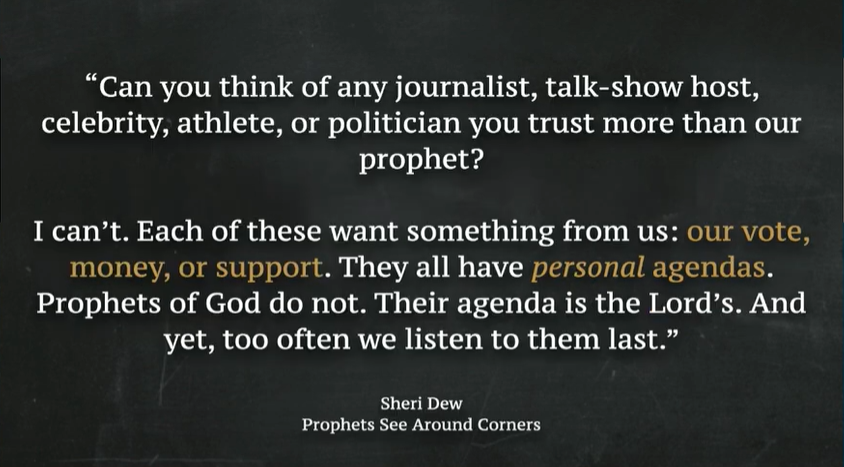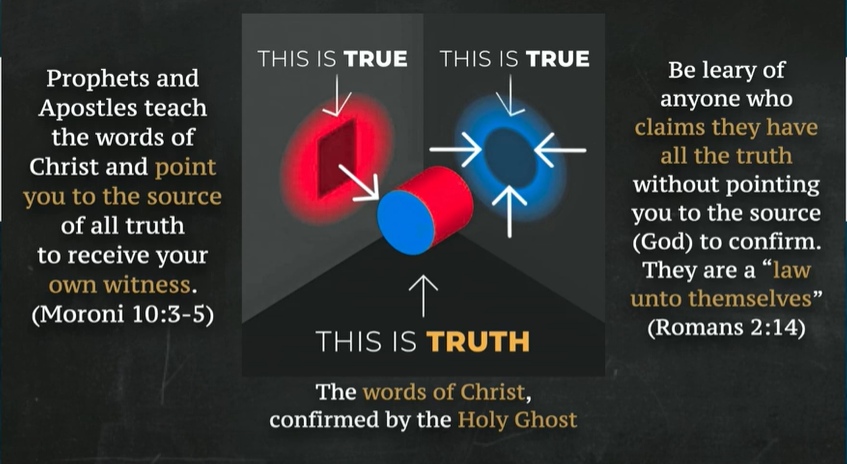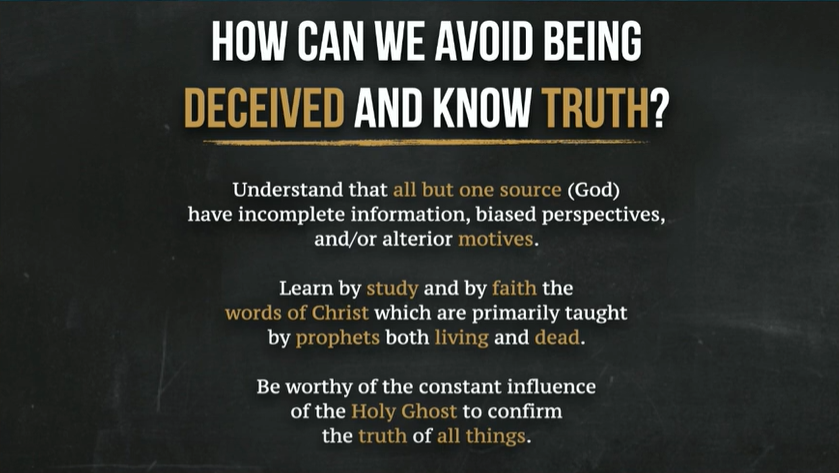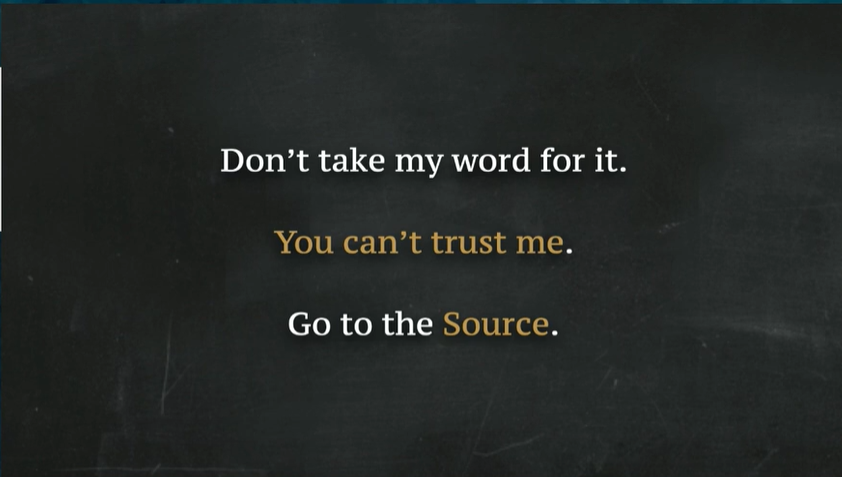Parker Walbeck’s Navigating Media Sensationalism: Our Critical Thinking Crisis emphasizes the need for critical thinking in media consumption while highlighting Jesus Christ and prophetic guidance as the only unfailing sources of truth.
This talk was given at the 2024 FAIR Conference “FAIR and Valiant Voices”, on the campus of the American Heritage School in Salt Lake City, Utah, on August 9, 2024.

Parker Walbeck is a filmmaker, content creator, and social media expert. After building a YouTube channel with 2 million subscribers and working with top global brands, he launched True Millennial, a faith-based channel where he shares his testimony of Jesus Christ and supports others on their spiritual journeys.
Transcript
Parker Walbeck:
My name is Parker Walbeck. I guess I’m a true millennial – I try to be. But I want to talk to you today about a topic that is very near and dear to my heart, and that is navigating media sensationalism. I want to talk about how we can become better critical thinkers, to avoid being deceived and to find truth.
What I’ve Learned from Working in Media
I’ve been working in media for about 12 years. I ran a YouTube channel for all that time, and was able to gain millions of followers, and worked with some of the biggest name brands in the world. I’m a videographer or cinematographer, and an influencer and editor.
I understand and know media very well, and I’ve learned quite a few lessons from being in media that I wanted to share with you today, that have made me understand how easy it is to sway public opinion if you possess the cunning and crafting skills of being able to use words and images to your favor to craft specific messages.
An experience with sponsorship
One example: About seven years ago, I got an email from Canon, who at the time was the camera brand I was using, and I was super excited. I had always wanted sponsorships, and here the very camera that I was using was saying “we’ll sponsor one of your videos.” And so I said yes, and they sent me a camera that they wanted me to promote. Unfortunately, it wasn’t a camera that I used or would buy.
An Influencer’s Dilemma
So, I was faced with this dilemma. I want the client, I want the money, I want that relationship. But I don’t really know if I believe in this product. So I came up with an idea and said, “Well, I’ll promote it as the best vlogging camera.”
Now, I’m not a vlogger, so I personally wouldn’t use it, but I could see how somebody who would vlog would use it. So that was my approach.
Needless to say, the comments I got were telling me I was a sellout and that I wasn’t giving an honest review. And I learned in that moment that my approach wasn’t quite right.
You Can’t Trust Everything You See in the Media
I learned the dilemma that media members go through, where we are marketing and advertising and trying to make something appear in its best light. That’s marketing and advertising at its core. But we’re also trying to be honest and true to our values and morals that we possess.
We need to understand that everything we consume online is coming from people who are facing that dilemma, and hopefully they are trying to do what is true and honest. But that’s not always the case. Or even if it is, they may have different values and morals that we don’t have, and so we just won’t see eye to eye.
You can’t trust what you see
The point is, you can’t trust what you see on TV and by association, the internet at large.
That larger picture behind is reality. What you’re seeing through your phone or through the TV is a part of reality. It’s still true, but it’s crafted in a way that might not be true.
The Big players in media
Now, it’s important to know that in the 1980s, media outlets were controlled by around 50 different companies. Nowadays, they’re controlled by only six. So we went from a lot of different perspectives and a lot of different sources of truth, to it being consolidated to a very few who have the power to control the narratives of what we see in our feeds online and on TV every day.
can we trust the big six?
So we need to understand that unless these giant companies who have bought up all the smaller companies can be trusted with truth, we should be leery about what we are consuming every day by any media company.
If you don’t believe me that media manipulation exists, I’m sure you’ve seen this clip. If you haven’t, watch this.
- [media clip transcription]
- Voice 1: “The sharing of biased and false news has become all too common on social media”.
- Voices 2, 3, 4 . . . (each voice added is saying the same thing): “The sharing of biased and false news has become out all too common on social media. More alarming, some media outlets publish things that simply aren’t true without checking facts first.”
- All voices overlapping and continuing: “Unfortunately, some members of media use their platforms to push their own personal bias and agenda to control exactly what people think. And this is extremely dangerous to our democracy.”
They are guilty
The very thing that they are preaching, ironically, they are guilty of – controlling the narrative to make you think exactly what they want you to think. These are different news hosts from all around the country who have been fed the exact same script from that one controlling voice who has a specific narrative that needs to be crafted.
Hopefully they’re centered in truth… but most likely they are not.
There are a powerful few who do manipulate and craft the narratives that they would like us to believe.
The Perfect Wedding Day
This is a video that I created. This is a wedding video of my cousin that I shot years ago, and I’m going to show you how I can take the exact same footage from that wedding day, and I can either make you believe that it was the best day ever, or the worst day ever, based on what I want you to believe about it.
So first, let’s watch the best day ever.
[1st video clip] Smiles, joy, flowers, romance.
A Terrible Wedding Day
As everyone knows, wedding days are flawless. They are perfect. And that is exactly what I wanted you to believe. But let’s assume that Janessa did something nasty to me. And I did not like her anymore. So I dug up this footage and I created a hit piece. I wanted to expose the truth about Janessa. I wanted to show you what was really going on that day.
[2nd video clip]
Fighting. Bickering. Thunder, lightning. It was just overall a dramatic, lousy day.
Both are true
Which version is true? Well, the truth is, they’re both true. This is the same footage. I’ve just manipulated it to make you feel a certain way about what is true. The reality is the truth is somewhere in the middle. It wasn’t the best, perfect day. It also wasn’t a day full of fighting and bickering. There were their moments, but most of it was somewhere in the middle.
Out of Context
How was I able to manipulate you? Well, from that probably six hours of footage I had, I pull the best 1% of the footage, and I cut out the part before and after. That wasn’t quite as good. And I craft that all together. Put it to romantic, happy music with vibrant colors and slow motion, making it feel dreamy.
Or I take the 1% that was the worst moments and cut out the part before and after that was laughing off the joke that I made that seemed rude, but was actually a joke. And then I put dramatic music, dulled the colors, and and put it to normal motion so that it felt more chaotic.
Now both of these, what they share in common, is that they were out of context.
If you had the context, it was wrapped around what happened before and after those you’d see that that’s not really true. I cherry-picked clips to exaggerate the truth. This is media sensationalism.
Media’s Business is Making Money NOT Truth Telling
Media’s job is to make money. I know that might sound surprising, but we are doing it as an occupation and at the end of the day, our primary objective is to maintain our job and to continue making money.
So if we can understand that – that media (hopefully) is trying to tell us as much truth as it can, but the primary objective above that isn’t to tell all the centered truth, but to give a part of that truth that will allow them to keep their job and make money – it will help us as we navigate on social media and on the internet, and as we watch TV.
Anybody who has seen an advertisement should understand that this is how advertising works. It is not our primary goal to tell truth. It is our primary goal to sell you something, to make you give our client money so that they will give us money.
Now, it is worth noting that in this particular example, the truth was somewhere much closer to the happy version of it. It was really hard for me to find thiry seconds of fighting and bickering and something that looked negative. It took me a long time sifting through generally happy footage. And so the truth is that that wedding day was somewhere much closer to the happy version.
We go through that every day as consumers.
Shopping on Amazon
One example is when you’re shopping for something on Amazon, do you go and just read the one star reviews, just the five star reviews, or do you usually read a few of both to get a better picture of what is actually true somewhere in the middle?
Now, in this example, most decent products on Amazon have a 4 to 4 and a half star rating, which means they’re probably going to lean closer to the five star ratings. And so if you tell me that you only read one star reviews and then you make your decision on what is true, I’m going to tell you, you’re a poor critical thinker and that you ought to balance your information with multiple sources, multiple perspectives.
But even then, the only way to really know what is all the truth is by buying the product, handling it yourself, and having your own experience with it. You still, at the end of the day, after gathering a lot of good information and perspectives, you still have to have your own experience to really know what is true.
Critical Thinking on YouTube
Let’s relate this to the gospel of Jesus Christ. This is a thumbnail on the right here that I pulled up from YouTube – a real thumbnail that says, “Survivor of Mormon Sexual abuse speaks out.”
Now, I’m sure this person had a real experience, and I’m sure there’s some truth to that experience they had. But I made a contrasting thumbnail that says, “Most Mormon bishops serve boringly well.”
Now, most of the people in this room would probably agree that that’s most of our experiences. But we’re not really sharing that because it’s kind of boring and maybe not worth speaking out about. When you buy something on Amazon and it’s really bad, you feel like you need to go review it and give it that one star review.
The Loudest Voices are the Negative Ones
So the loudest voices are going to be the negative ones. If you buy a product that works boringly well, you’re probably not going to go leave a good review.
And unfortunately, we do the same thing in the Church – and that is why David A. Bednar in, 2014, invited members of the Church to use the inspired tools of social media to share messages of truth and light, to share our positive experiences– our “five star reviews” about the Gospel of Jesus Christ – so that we can combat these negative reviews and show the world that this actually is a great thing.
A lot of times we just go about living the gospel boringly, and it just serves us well and makes us happy. But we ought to be a part of the solution of putting out some of that positivity to combat the negativity.
Which Headlines get engagement?
But even if we do, which headline is going to get clicks? Which one is the media going to take off with? Which one is going to go viral? Not the one where we’re putting out boringly positive messages about the gospel. It’s going to be the negative ones.
We need to understand that as we are navigating social media, as we consume online, what’s being fed to us in our feeds is primarily the sensational; and the parts that are more true, not worth picking up, not worth writing a story about. So we have to do a lot more digging, put in a lot more effort to go and seek out and find those other perspectives, those positive perspectives.
Who Can I Trust to Tell Truth?
So if we can’t trust media, who can we trust to tell the truth?
This is a non-exhaustive list of other organizations and individuals that also do not hold all truth. None of these are the arbiters of truth.
Now, there is truth contained in all of it, but it is not the job of any of them to tell truth. We need to understand that there are motives behind all the media we consume.
What is the Motive?
As one example, I pulled these website screenshots from a prominent exMormon podcaster who puts out hundreds of videos convincing and trying to lead people out of the Church. And what do you know? He has a service on his website called “Faith Crisis Transition Coaching” that you can buy, for a mere $375 per session. You can get help leaving your faith after he has helped you leave your faith.
A Conflict of Interest
If we don’t understand the conflict of interest there, we are not very good critical thinkers. We need to:
- look at the sources of the information we’re being given
- do our research
- discover motives
- look at the fruits of the people who are creating that information
and decide if that is a trustworthy source, or if there could possibly be other motives for why that person is creating what they’re creating.
It is your job to find truth
Now, I’m not saying there isn’t truth that comes from these individuals and organizations. All I’m saying is we need to be smarter. We need to critically think before believing everything we hear online from ‘experts’ or ‘doctors’ or PhDs. I’m not here to villainize media, I’m just here to clue you in that it is not our job to tell you truth. It is our job to make money. It is our job to keep our job. It is your job to find truth.
Where can we find truth?
Jesus Christ–Our Only Source of Complete Truth
There is only one source of truth that is complete, correct and incorruptible. That source is our infinitely wise and all knowing Heavenly father. He offers us his truth through Jesus Christ and the gospel that he teaches us.
Jesus Christ is the truth, and as we feast on his words, it will tell us all things we should do.
And by the power of the Holy Ghost, we can know the truth of all things. Heavenly father, through the words of His Son Jesus Christ, confirmed by the Holy Ghost, is the only source of all truth.
Protection From Media Manipulation
How can we protect against media manipulation? At the beginning we talked about whoever controls the media, controls the mind.
The Power of the Word
Alma taught that the virtue of the Word of God has a more powerful effect upon the minds of the people than the sword or anything else – and that includes media. Media can control our mind. But even more powerful to control our mind is the source of all truth: The Word of God.
How to Discern the Truth
If we are seeking to cut through the cunning and snares and the wiles of the devil so prevalent in the philosophies of our day, we need to rely on and try the virtue of the Word of God.
Now you may be asking what makes the words of Christ so special? Why are they different from everyone else’s words?
Christ tells ALL the Truth
Well, because Christ tells all the truth. He is not interested in telling you smooth things. He doesn’t want to tell you what you want to hear. He doesn’t have a personal agenda to maintain power or to build his business.
If he’s going to teach you about love, he’s also going to teach you about law. He’ll teach you about mercy, but he’ll also teach about justice. He will talk about reward, but also punishment.
He’s not going to tickle your ears, He’s just going to tell you what is true. He will talk about how blessed you’ll be if you follow him, but he’ll also talk about how persecuted you’ll be if you follow him.
He is not sugarcoating his words, He is telling you all truth. He is the only being who teaches all truth. He is the only source we can rely on.
Primary Goal of Christ
And His motive is to bring to pass the immortality and eternal life of man.
That is his primary goal, as he wants the welfare of our eternal souls. He wants us to be happy in this life and happy in the eternities. The only person who’s walked this earth who has perfect motive.
Christ Himself told us who we can trust
And who did Christ authorize to teach his gospel?
Ye are built upon the foundation of the apostles and prophets, Jesus Christ himself being the chief corner stone.”
We are taught to be built on the foundation of apostles and prophets, with Jesus Christ as the cornerstone.
The Twelve Apostles
It is only those 12 men who he originally ordained that he gave power and authority and keys of the priesthood to teach his truth to the rest of the world.
Now they are not perfect, but in my opinion, they are the most trustworthy sources we have to point us to the source of truth, Jesus Christ.
A Common Misconception
A misconception is that they stand between us and that we should trust in the prophets, and that they are the end all, be all. And that is not true. They are not there to be the source of truth for us. Rather, they stand beside us and they point the way to the Savior.
Prophets Point to the Source
And if we are listening to what they are saying, they are always pointing us to the source. As our prophet has recently told us, if we’re going to survive in these last days spiritually, if we’re going to navigate media sensationalism and manipulation, we have to have the constant influence of the Holy Ghost. We have to have a member of the Godhead with us at all times to help us discern and disseminate truth and error.
Do “Mormon” Leaders get paid?
Now you might be saying, but don’t the brethren make money? They have ulterior motives too, don’t they?
Again, I would invite you to think critically. Go look at the source. Look at the fruits of these prophets and apostles. Study their lives, see where they’ve come from. Many of them have had incredibly successful careers, making 2 or 3, 4 or 5 times more money than their stipend to be able to travel the world till the day they die in their old age sharing the gospel of Jesus Christ.
In my opinion, it is not good critical thinking to believe that their motive is money. You don’t take my word for it though. Here is President Holland telling you what his motive is.
Elder Holland: I get up every morning saying, not “How can I pretend?” Not “How can I act like this is true?” My plea every morning of my life is, “How can I convey what I know to be more true than anything on the face of this earth? How can I convey to some person or persons the reality of the divinity of the Lord Jesus Christ? The fact that God lives, that the heavens are open?”
I have a commission to stand by the Savior of the world, to defend Him and defend the rock that He is.
A missionary once asked me, “Elder Holland, would you give your life for the Church”? And I said, “Elder, I am giving my life for the Church. Every day I’m giving my life for the Church, because I know it’s true.”
Does that sound like a man motivated by money?
Trustworthy does not equal perfect
Now let’s be clear. Prophets and apostles are not perfect. But in my opinion, they are the most trustworthy humans with the purest motives that can help us find truth because they are pointing us to Jesus Christ.
They share his motive, which is to bring to pass the immortality and eternal life of man.
Sheri Dew said,
Can you think of any journalists, talk show hosts, celebrities, athletes or politicians you trust more than prophets? I can’t. Each of these want something from us, our vote money, our support. They all have personal agendas. Prophets of God do not. Their agenda is the Lord’s. And yet too often we listen to them last.
Coming back to our graphic here. Prophets and apostles (in the red) aren’t saying, “We are the source of truth.” They are teaching truth and then pointing you to the source to receive your own witness of truth. If somebody claims that they have truth without pointing to the source of truth and inviting you to receive your own confirmation from the source of truth about what they say, then they are a law unto themselves, and you ought to be leery about what they are teaching you.
How can we avoid deception
How can we avoid being deceived and know truth? In recap:
- We need to understand that all but one source have incomplete information, biased perspectives, and/or ulterior motives.
- We need to learn by study and by faith, the words of Christ, which are primarily taught by prophets, both living and dead.
- And we need to be worthy of the constant influence of the Holy Ghost to confirm the truth of all things.
No Q&A was offered for this presentation.
coming soon…
- Date Presented: August 8, 2024
- Duration: 27 minutes
- Event/Conference: 2024 FAIR Conference
- Topics Covered: “Mormon” temple ceremony, temple preparation, spiritual depth and maturity, sacred rituals and symbolism, overcoming cultural barriers, faith and covenant making, parental responsibility, rituals across religious traditions, hope and endurance.
1. Media Manipulation and Truth in Religious Contexts
- Concern: “How can we trust religious leaders if media manipulation is widespread?”
Response: Parker Walbeck highlights how media often skews narratives for profit, emphasizing that prophets and apostles serve with spiritual motives rather than financial incentives. Their teachings point toward Jesus Christ, the ultimate source of truth, and invite personal spiritual confirmation through the Holy Ghost.
2. Trust in Prophets Despite Human Imperfection
- Concern: “If prophets are imperfect, how can they be trusted to teach truth?”
Response: While acknowledging prophets’ humanity, Walbeck stresses that their divine commission is to direct individuals to Christ, the only source of complete truth. Their personal sacrifices and lifelong service reflect spiritual dedication, not personal gain.
3. Critical Thinking vs. Blind Faith
- Concern: “Does relying on faith discourage critical thinking?”
Response: Far from discouraging critical thinking, Walbeck argues that the gospel encourages intellectual and spiritual inquiry. He emphasizes using both study and faith, seeking truth from multiple sources while allowing spiritual confirmation through personal experience. - Relevant FAIR Resource:
What is Critical Thinking?
4. Financial Motives of Church Leaders
- Concern: “Don’t religious leaders profit from their positions?”
Response: Walbeck addresses this common criticism by inviting a closer look at Church leaders’ lives. Many apostles left lucrative careers for lifelong, modestly paid service. Their primary motivation is spiritual, as demonstrated by their actions and teachings. - Relevant FAIR Resource:
Church Finances
- Media Bias Against the Church
Apologetic Response:
Walbeck highlights how negative stories about the Church of Jesus Christ of Latter-day Saints often gain more media traction due to sensationalism. He contrasts viral negative headlines with the reality that most Church leaders and members serve faithfully but without media attention. This demonstrates the imbalance caused by media-driven narratives. - Financial Motives of Church Leaders
Apologetic Response:
Addressing the common critique that Church leaders are financially motivated, Walbeck explains how apostles sacrifice lucrative careers for modest stipends. He points to their lifelong service and personal testimonies, such as Elder Holland’s declaration of spiritual commitment, as evidence of pure intent rather than material gain. - Trusting Imperfect Prophets
Apologetic Response:
Walbeck acknowledges that prophets are human and therefore imperfect, but emphasizes their divine commission to point people toward Jesus Christ. He explains that their role is not to be the ultimate source of truth but to guide individuals toward personal spiritual confirmation through study, prayer, and the Holy Ghost.
Amara. “Who Are the Biggest Players in Media? 🗞.” Genuineimpact.Substack.Com, Genuine Impact – Because your money deserves better, 29 May 2023, genuineimpact.substack.com/p/who-are-the-biggest-players-in-media.
Share this article
